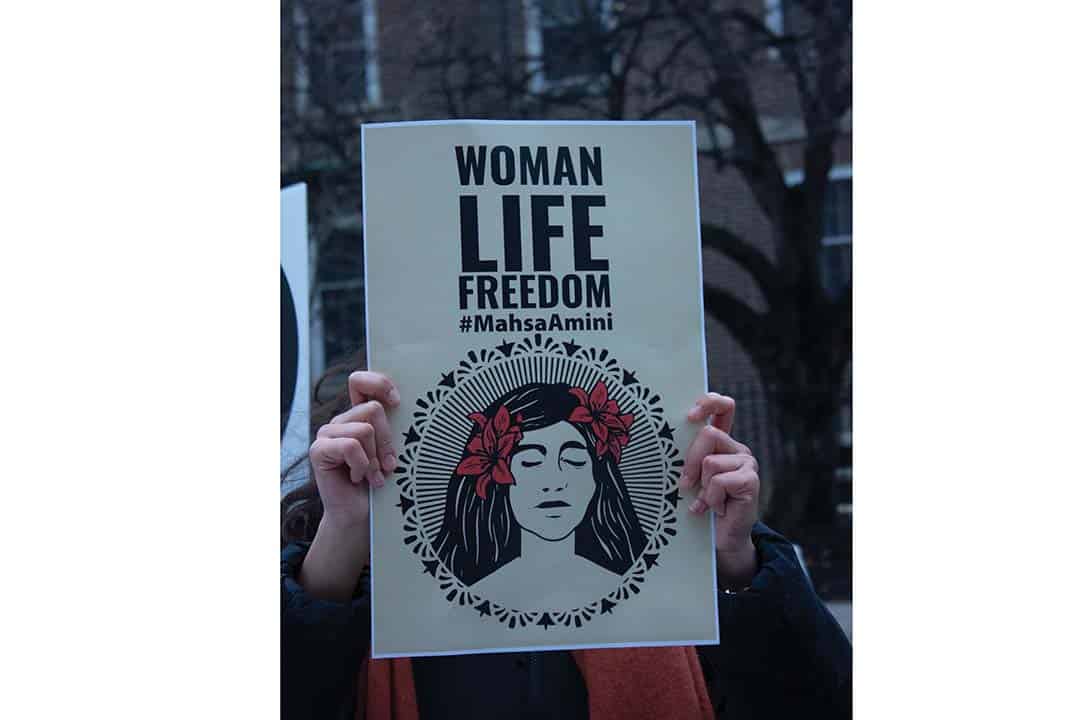On November 30, Iranian students and allies at U of T formed a human chain along St. George Street, between the road’s intersections with Harbord Street and Willcocks Street. The chain was part of a rally hosted by the University of Toronto Students for a Free Iran (UTSFI).
This rally took place during an ongoing global movement sparked by the death of Mahsa (Jina) Amini on September 16. Amini was a 22-year-old Iranian-Kurdish woman who died in custody after Iran’s “morality police” arrested her for violating Iran’s mandatory dress code.
Amini’s death ignited national protests in Iran. In the weeks since then, protestors’ fury has grown into a global condemnation of the Islamic Republic’s regulations and its regime as a whole.
The UTSFI’s rally was held as part of a global initiative to show solidarity with people protesting in Iran. More than 200 other universities worldwide also hosted campus rallies on the same day.
“Amplify the voice of the people”
To mark this day of action, members of the UTSFI stood outside Sidney Smith Hall and held signs with images of people that the Iranian Regime had killed. UTSFI members also led chants calling for justice for victims and other Iranians. UTSFI executive member Niloofar Ganji read aloud a statement that was written by the UTSFI and the Iranian Scholars for Liberty. The Iranian Scholars for Liberty, which is a nonpartisan, nonreligious group formed by Iranian faculty, students, staff, and alumni from over 100 universities from across the world.
The statement called attention to the arrests and murders following the protests in Iran. As of November 12, the Iran Human Rights group, a nonprofit organization that operates in and outside of Iran, reported at least 400 deaths so far with regard to the ongoing protests. The statement also emphasized the increasing suppression that the Iranian regime has subjected the country’s ethnic minorities, such as the Kurdish and Baloch people, to following the protests.
The statement also highlighted how protests in Iran have been negatively affecting the country’s students. It specified that Iranian police, the Islamic Revolutionary Guard Corps, the Paramilitary Volunteer Militia, and the Plainclothes Police have raided campuses, dorms, and high schools, and have assaulted and arrested Iranian students. The statement added that professors and instructors have also been fired or suspended because of their support for the students.
The Iranian Scholars for Liberty’s own statement, posted on its website, includes a list of demands for “academia and governments” to meet. These demands include issuing statements condemning and demanding an end “to the assault on the academic community in Iran,” boycotting Iranian academics who have facilitated or are facilitating the Regime’s attacks on Iranian students and scholars, and to disengage with the Islamic Regime’s lobbyists “who promote the Regime’s propaganda.”
According to the Iranian Scholars for Liberty’s website, the group’s short-term goal is to “[elevate] the voices of Iranians fighting for freedom… as a result of decades of persecution.” The group’s long-term goal is to raise global awareness of the physical and verbal harassment that the Iranian regime has on Iranians, as well as call attention to the police’s crackdowns on nonviolent protests within the country.
“We are standing with them”
In an interview with The Varsity, UTSFI member Sara Shariati said that the UTSFI was formed by students who previously didn’t know each other but had all previously organized protests at U of T. Once protests started happening in Iran, Shariati explained, these students came together, realizing that they had a shared goal.
“We decided to join our voices so that we could form a stronger group,” Shariati said.
As outlined by the UTSFI’s Student Organization Portal page, the group aims to create safe and inclusive spaces for Iranians and Iranian Canadians at U of T to “engage with and preserve the Iranian cultural and historical heritage.” To accomplish this, the UTSFI has set the following goals: to address the history of oppression in Iran, to preserve and document it, and to provide “an open platform to the Iranian community to emerge as a free society from this history.”
Shariati highlighted the necessity of consistent rallying from groups such as the UTSFI, because “pressure works.”
“Normal people have power, and it shouldn’t be underestimated,” Shariati said.
Moreover, Shariati pointed out the importance of calls for action happening in university settings, saying that “the hope of any country should be its students.” When rallies are organized by people in academic settings, Shariati explained, it demonstrates to others globally that educated people want to amplify the voices of Iranians. Shariati added: “[It lets] Iranian students… know that we are also standing with them.”


